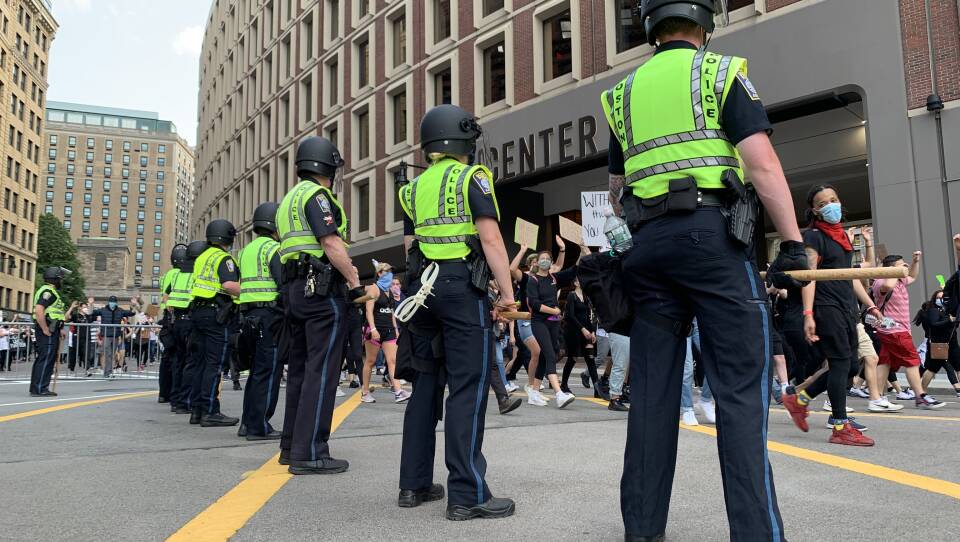As Gov. Charlie Baker wraps up the year by signing the police reform bill, the new law is receiving mixed reviews by legislators and civil rights advocates who say more needs to be done to protect vulnerable communities.
State Sen. Sonia Chang-Díaz, who was one of the bills sponsors, said the law is a “mile-marker,” but not an end to an ongoing fight against racism in policing.
While she praised the bill for banning chokeholds, banning racial profiling and limiting no-knock warrants, Chang-Diaz added there is more work to be done to combat systematic racism.
“No one bill will dismantle structural racism — in policing, or in all the other places it exists,” she said in a statement. “As much as we celebrate these hard-won steps forward today, we must equally resolve to keep walking the road of racial justice in 2021."
In a subsequent interview, Chang-Diaz said it's shocking that some of the reforms took so long to accomplish.
“When I say a mile marker, it’s a huge mile marker, a huge step forward in in the push for accountability and for justice in law enforcement," she said. "But it is also a heartache, for the things that that we had to push so hard and fight so hard for that should have been an easy yes that weren't included in the bill. So it really is both a victory and a call to continued organizing.”
The law comes after protesters and activists demanded throughout the summer that legislators and public officers examine the role of policing and the intersection of racism and systemic violence following the deaths of Breonna Taylor in Kentucky last March and George Floyd in Minneapolis last May.
The new law creates a mandatory certification process for police officers and “generally precludes” officers from using rubber pellets, chemical agents or canine units against a crowd. It will also establish four permanent commissions on the status of African Americans, Latinos and Latinas, people with disabilities, and the social status of Black men and boys.
“This bill is the product of bipartisan cooperation and thanks to the Black and Latino Caucus’ leadership on the hugely important issue of law enforcement accountability, Massachusetts will have one of the best laws in the nation,” said Baker. “Police officers have enormously difficult jobs and we are grateful they put their lives on the line every time they go to work. Thanks to final negotiations on this bill, police officers will have a system they can trust and our communities will be safer for it.”
The bill, known as “An act relative to justice, equity and accountability in law enforcement in the Commonwealth,” was amended by Baker to strengthen due process protections for law enforcement, include police labor representation on the commission, and bolster controversial facial recognition provisions, which Baker calls “lifesaving tools” in his statement.
State Rep. Russell Holmes of Mattapan, who also sponsored the legislation, called the law “an important step” forward after the deaths of Floyd and Taylor led to massive marches against police brutality in Massachusetts and across the country.
“For too long, Black and Latino communities have been demanding change and accountability when it comes to policing in our communities and across the Commonwealth,” Holmes said in a statement. “While we are glad this bill is now signed into law, we must now also reflect on the importance of this fight, and resolve to build on these reforms in the future.”
Carol Rose, executive director of the Massachusetts ACLU, echoed that sentiment.
“This is a compromise bill. While it lacks many of the protections advocated by both civil rights and community leaders, it also includes key provisions that will save lives, advance civil rights, and safeguard liberties,” Rose said in a statement. “The new law lays the groundwork for the legislature to enact additional civil rights and civil liberties protections in the upcoming legislative session, and the public pressure for change will continue.”
Chief Edward A. Dunne, President of the Massachusetts Chief of Police Association, said his members are “eager to turn the page on what has been an unprecedented and incredibly difficult and enduring year on so many different levels,” in a statement. “We are extremely confident that this comprehensive legislation signed into law by the Governor today will serve to renew an elevated sense of faith, confidence, and trust that the residents of the Commonwealth will have in their law enforcement agencies across the state.”





